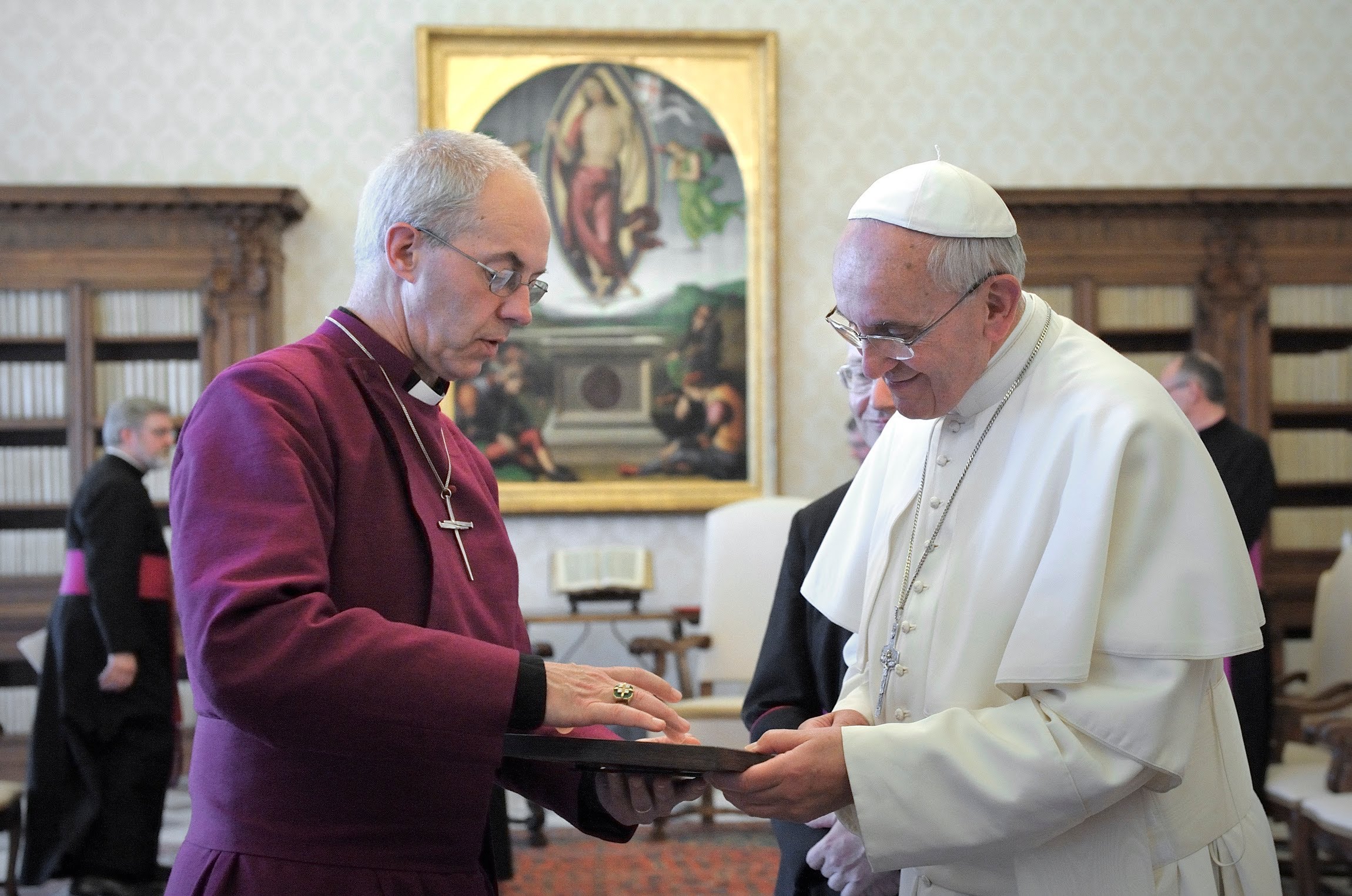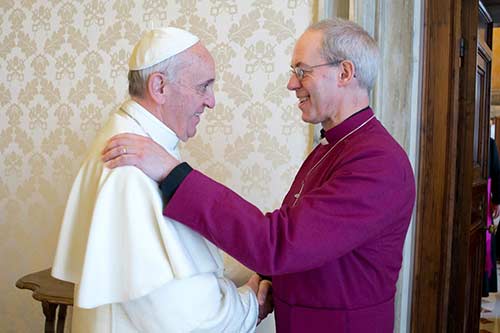This month, Pope Francis and Archbishop of Canterbury Justin met for the second time.
Some are often over-optimistic – organic Christian unity can be made to look just around the corner. A long list of documents agree on everything from the eucharist, church, ministry, authority, salvation, ethics, and Mary. There is not one single area of theology in which we do not have some measure of agreement.
Some are often over-pessimistic – (newer) barriers include ordination of women, controversy about gays, disunity within Anglicanism, Anglican Ordinariates,…
The reality is probably closer to person-to-person encounters. The Archbishop is a Benedictine Oblate with an appreciation of Ignatian spirituality who invited Chemin Neuf, a French Catholic community with an ecumenical vocation, to live with him at Lambeth Palace. Pope Francis is influenced by charismatic renewal (as is Justin). Receiving from one another’s traditions, “receptive ecumenism”, may be a new way forward. What treasures might we receive from one another?
While in Rome, Archbishop Justin launched the new International Anglican-Roman Catholic Commission for Unity and Mission (IARCCUM) website. Do take a look. Then pray for Archbishop Justin and Pope Francis, and both churches.
Further reading:
Could the Archbishop and the Pope really reunify the Church?
Two traditions, one holy ground (H/T Fr Ron Smith)
Archbishop meets Pope Francis in Rome





Organic Christian Unity already exists among Protestant-Christendom despite temporal and doctrinal differences. Ecumenism of this nature is a consequence of a compromised faith. As the social and spiritual climate popular suggests among the ruins of Protestant-Christendom.
Your comment on person-to-person relations being a sign of church unity makes me want to share, here, a resource which has been of great help for me. I am in an ecumenical/interchurch relationship, which is the epitome of person-to-person relationships showing unity! If you search “interchurch families” on the web, a small handful of resources appear, speaking of how ecumenism is played out in the lives of (brave, I think) couples who are both grounded and active in their own (different) church traditions. Despite (or because of) their differences, these couples often have strong relationships and navigate the space in and between traditions with messiness and grace.
Thank you, Teresa. A very important point, insight, mission and ministry. Blessings.
We must live with and in hope.
I’m glad to see this happening, and I’m not surprised with the particular people involved, but we’ll have to have more than just individuals involved, otherwise there will be no real change.
I was an undergraduate from 1974-78. In the rural village where my college was (in New York State)there was no Anglican parish. So for three years I was a full participant in a Roman parish, becoming the liturgy chair of the Catholic Campus Community my last year. The only requirement (from the RC bishop)for me to be a regular communicant was that I signed a statement that said I believed in the Real Presence of Christ in the Eucharist. That was his pastoral provision for Lutherans and Anglicans who had no parish close by. The RC diocese in that area was notably liberal at that time, but some years later that would not have happened – sadly – as the Vatican and US Conference of Bishops became more conservative/traditionalist. I guess the thing I would like most in Anglican/Roman relations is for the validity of Anglican orders to be recognized, and for full Eucharistic sharing to become the official policy.
Dear Fr Bosco,
I like your idea of receptive ecumenism. Sadly, I don’t see it much from Rome’s side. If Rome had had a will of receptive ecumenism, they would have, at the very least, reintroduced the communion under both kinds as normative, and Eastern anaphoræ, and the priestly ordination of heterosexually-married males. The did none of these three minima minimorum.
The sticking point is now the Apostolicæ curæ, which has again been reaffirmed by Pope Ratzinger. It’s one on the most hypocrite attitude of Rome. (Since, from one side, Rome herself does nowadays the things rebuked by Ap. c.; and, from the other side, Rome recognizes male-to-male ordinations of Old Catholics and Swedes, who are in full communion with the anglicans.)
Both pope Bergoglio and abp Welby are too superficial to do some real ecumenism.
Now, your person-to-person ecumenism is a good observation. For example, in the Holy Land, as is publicly acknowledged by abp Elias Chacour, abp George Khodr, and patr. Boutros Al-Rahi, they do full communion at a “local level”, in spite that it is not agreed by the CCEO, nor by other Easterners, let alone the Athonists. Will Bergoglio and Welby have the wisdom of Chacour, Khodr and Al-Rahi? I doubt it very much.
I fear Georges that you do not fully understand the mechanisms of the Latin Church. You say, “The sticking point is now the Apostolicæ curæ, which has again been reaffirmed by Pope Ratzinger.” Pope Benedict no longer has authority, which renders your statement null and void.
We must give Pope Francis a chance – he’s been in the job a little over a year. Jesus, while condemning the action of the religious hierarchy of his day, did not condemn the men themselves, but preached for a change of heart – one or two of course headed his words. Pax
You know, there is a lot to be said for doing ecumenism this way. Christian churches, treating each other as human beings, cooperating on social projects, yet remaining independent, win each church preserving its own distinctive spirituality, liturgical heritage, and traditions. I for one dombelievemthenapostolic faith still exists, and can be found in some places, but the best way to allow it to be discovered is to foster n attitude of quiet, civil , Christian congeniality, as opposed to the high pressure, M&A style ecumenism that some people seem to prefer.
“My Father’s house has many mansions.” ( Thank God not all of them in the style of Bishop Bling ).